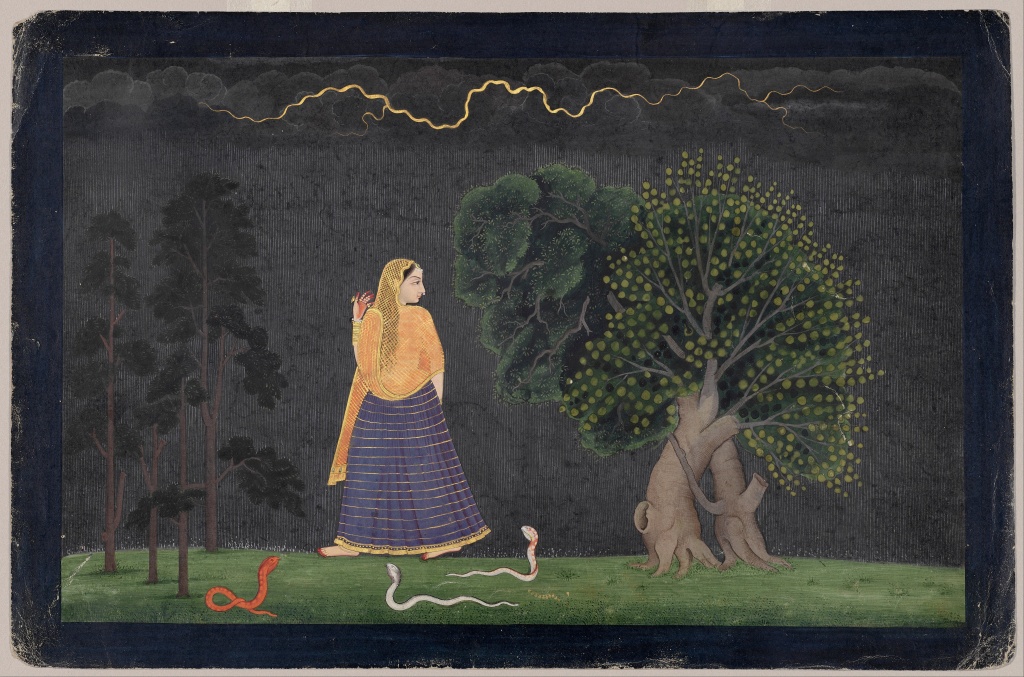
Human emotions such as love, anger and sorrow have a universal dimension, affecting all peoples in all times and places similarly. But emotions also perhaps have a specific way of emerging and manifesting themselves which perhaps varies according to contextual factors. Music and seasonal changes may sometimes kindle a romantic mood.
The deeply-pitched rhythms reverberating from the drum animate our spirits, and make peacocks dance,
[Mālavikāgnimitram Act 1 Verse 21; my own translation]
And peacocks call out responses while turning their necks up, as they take it to be the rumbling of clouds.
Woods, with the delightful fragrance of chaste-tree blossoms,
[Ṛtusaṃhāra – Autumn – Verse 14; my own translation]
Echoing with the sounds of flocks of birds sitting comfortably,
And with the lotus-eyes of deer resting round about,
Fill our minds with ideas of romance.
One may immediately fall in love with an unknown stranger after just a fleeting glance, overwhelming one’s mind with emotion. After seeing Mālatī at a festival, Mādhava reports –
There is some kind of change in me, which can’t be defined, which can’t be put into words, which I have never experienced before in my life, an infatuation which stops me thinking clearly, and which both stuns me and burns me inside
[Mālatīmādhava Act 1 Verse 30; my own translation]
One may possibly be bashful and uncertain about moving forward in the relationship.
When the one who I truly loved surrendered himself to me, I was too timid.
[from Abhijñāna-Śākuntalam Act 3; my own translation]
So why am I tormented by regret now?
On the other hand, there may be an unexpected forwardness in romance.
He was embarrassed
[Gāhā Sattasaī Verse 158; translation by Prof. Peter Khoroche and Prof. Herman Tieken]
But I laughed and gave him a hug
When he groped for the knot
Of my skirt and found it
Already undone.
The power of love may inspire a person to slip away at night for a secret rendez-vous.
“There, on the King’s Road, at night, when sight is obstructed by the darkness [dense enough] to be pierced by a needle, show the ground by lightning, as charming as gold on a touchstone, to the women going to the homes of their lovers, and do not be resounding with thunder and pouring water; they are apprehensive.”
[Meghadūta Pūrvamegha 40]
And of course, there may yet be a chance for an intimate moment together, away from the incessant sociability of the entire household.
Seeing that the sleeping-quarters were empty, carefully raising herself from the bed, she continued gazing upon her husband’s face as he feigned sleep. When she boldly kissed his cheek, she saw him react and shyly turned her face down as he quickly started kissed her over and again.
[from Dhvanyāloka; my own translation]
The natural world too can be understood through metaphors of love, as when the Vipāśā and Śutudrī rivers address Viśvamitra with the following words-
Poet, we will listen to your words. You have come from afar, with waggon [and] with chariot.
I will bow down to you like a swelling maiden. I will open my arms for you like a young woman to a young man.
[Ṛg Veda Maṇḍala 3 Sūkta 33 Verse 10 of Ṛṣi Gopavana Ātreya; my own translation]
A tale of romance can even play out on grand scale in the skies –
The dawn reddens; the sun follows her
[from Dhvanyāloka; my own translation]
Oh strange fate. Still they don’t meet.
Indeed, even the gods themselves are not immune to the unfolding of romance and the pleasures of lovemaking, as we see in the case of the divine couple Pārvatī and Śiva.
She embraced her lover whilst pressed against his chest, didn’t turn away her face which he longed for, and only feebly pushed back his hand as he moved eagerly towards her jewelled belt
[Kumārasambhava Canto 8 Verse 14; my own translation]
A mother perhaps has a special keenness of interest in seeing the relationship flourish.
Her mother was encouraged to seeing that blue-throated [Śiva] was so fond of the youthful [Pārvatī].
[Kumārasambhava Canto 8 Verse 12; my own translation]
To explain, when wives are loved by husbands, grief is banished from the minds of their mothers.
It is interesting to speculate the ways in which the historic tradition of romantic encounter, as illustrated in love poems, continues to influence Indian society today, for example, through the medium of Indian film. In particular, we have seen how themes such as the cosmic drama, the secret tryst, the true heart and maternal affection all play a role in the full blossoming of love. We may end with a passage from what is perhaps one of the most beautiful verses from the Rig Veda, a verse in praise of the dawn, which already seems to present many of these themes in clever combination.
Lady [Dawn] does not transgress the established order (ṛ̱tasya̱ dhāman),
[Ṛg Veda Maṇḍala 1 Sūkta 123 Verses 9cd-10 of Ṛṣi Kakṣīvant Dairghatamasa; my own translation]
Going to the set place on the set day.
Like a young woman with your own victory,
Goddess, you go to the [sun] god who longs for you,
A blushing youth, before his eyes,
You reveal your breasts in the east.
Good-looking, like a young lady adorned by her mother,
You make your body a sight to be seen.
Dawn, you are excellent. Shine out far and wide.
Other dawns will not frustrate this for you.
Leave a comment